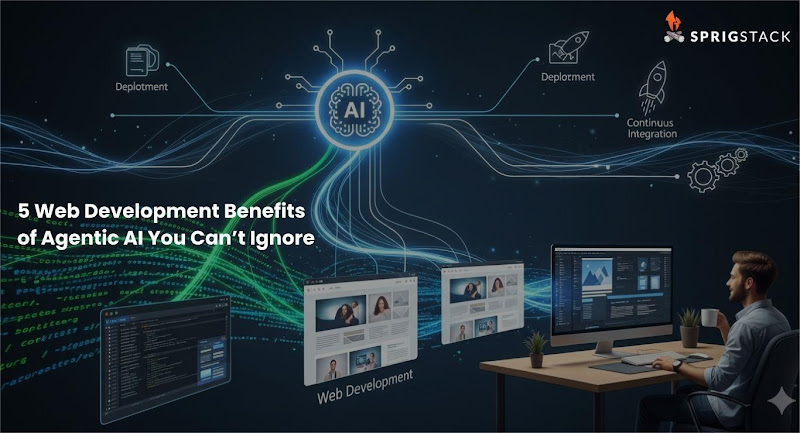As soon as you look ahead to the future of web engineering, the idea becomes just as much about modification as it does about delivery speed. Autonomous AI agents are like invisible co-workers, planning our work, contributing during design and development with smart coding, debugging, and optimally improving code. So, a web development agency benefits from faster delivery with super quality. Additionally, agentic AI delivers huge gains in draining monotonous work over and over. In fact, it allows the worker to be the manager of multi-step tasks from the start and manage with minimal supervision. Then it puts forward remarkably clearer and larger architectural visions. That is important since it allows programmers to better focus on features and care less about small repeat fixes. This change is important not only to productivity, but it also reiterates rethinking the ground structure of the workflow and releasing the teammates’ time for meaningful collaborations. It gives employers, or the owners, the chance to control the workflow at a strategic level at every stage with agentic AI. This is going to be an ongoing development, not just a mere trend! So, get yourself accustomed to agentic AI and what benefits it may bring to you in terms of website development.
What is Agentic AI?
Agentic AI is the term describing autonomous systems that plan and perform multi-step tasks without requiring significant human intervention. In other words, agentic systems are not only programmed but also learn, adapt to shifting contexts, make decisions on their own, and enhance results. In the case of web developers, agentic AI systems will write, debug, and test code as an active digital collaborator while you are operating within your standard workflow.
Top 5 Benefits of Agentic AI in Web Development
In brief, agentic AI works to simplify the web development workflow by combining scalable insights and autonomy with efficiency. Agentic AI deepens logic, automates activity, and cleans up architecture, which is especially beneficial when creating complex RAG powered web apps. Also, your team benefits from velocity, accuracy, and transparency while minimizing brain power on matters other than innovation. So, these intelligent systems will enhance every phase of your project with increased clarity and control.
-
Dynamic Rule-Based Control
Agentic AI has the capacity to flex rule-based workflows dynamically, depending upon project demands. It can modify traditional validation rules, as well as manage legitimate exceptions, without needing to be altered manually. A web development agency adapting agentic AI then experiences less manual supervision, and it occurs seamlessly. When ‘change’ does arrive, agents regulate systems with less disruption. This accelerates the development speed, and the frustration during an iterative cycle falls significantly.
-
Modular and Scalable Architecture
Agentic applied AI cultivates modular thinking by constructing individual components based on logically driven tasks. The agents compartmentalize tasks cleanly and enable flexibility in scaling features. For any web development agency, this flexibility extends functionality, allowing the system to be enhanced easily. Because the modules were technically decoupled, portions of the system can be changed without destroying the rest. Consequently, responsiveness can be radically improved across many potential projects.
-
Effortless Debugging
Because agentic AI tends to log its reasoning processes and decision paths, identifying bugs is never difficult. Rather than trying to trace back an unknown coding issue, you can build upon explicit logic flows. The frustration is reduced because you can see something is wrong and where the possible anomalies may occur. The moment anomalies begin to appear, the system shows its decision history, and also helps developers to fix the bug within the deadline quickly.
-
Cleaner API Layer
Agentic AI makes the API logic across endpoints uniform. This helps minimize random calls or inconsistency by ensuring that each API is implemented clearly and predictably. The programmer will know what will happen on a new dataset, regardless of the project on the API. Combined, these factors promote strong team collaboration and stability in programming. Better control of errors across integrated services helps encourage a larger platform that will have better maintainability and governance in the long term.
-
Transparent Logical Flow
An agentic system allows investigation into why things are chosen, and decisions are documented in human-readable formats. These informative features provide trust in the results that are provided by certain logical pathways. Whether in situ for a source audit or performance optimization, there are no doors closed to investigate. More transparency into logical rationales will help to build up more accountable governance and quality throughout the development process.
Real-World Use Cases of Agentic AI Web Revolution
By looking at the latest use cases, we can see some of the ways agentic AI is already reconfiguring development. Across enterprise platforms, cloud services, open protocols, and frameworks, agentic systems are starting to enable productivity gains and autonomy. For these systems, you don’t have to wait for the future – the implications are clear today.
-
Use Case 1: xAI and its Grok-Code-Fast-1 Agentic Coding Model
In August 2025, xAI announced grok-code-fast-1, an autonomous agentic coding model designed for and built for speed. It is a coding model that performs coding tasks with low latency and cost. At this time, it is free of charge to selected launch partners.
-
Use Case 2: Google and Gemini CLI Combined with Zed Editor and ACP
Gemini CLI has combined with the Zed code editor via Agent Client Protocol (ACP) in a seamless way that enables real-time code generation, refactoring, debugging, and multi-file actions in one context. Zed’s editing interface allows users to visualize the changes, similar to reviewing pull requests.
-
Use Case 3: AWS Announces its Bedrock AgentCore Platform
At the AWS Summit New York, Amazon announced the Bedrock AgentCore agent, allowing deployment of secure, modular agents in JavaScript and Python. This agent allows for services with memory, identity, and observability modules supporting modular/customizable agentic workflows in production.
-
Use Case 4: Protocol (MCP) Standardized Cultural Adoption
In 2025, the open standard (MCP) Model Context Protocol began receiving wide adoption in organizations globally. Many of the larger companies in the space, like OpenAI, Microsoft, and DeepMind, adopted and integrated the MCP standard. Collectively, there are over 5,000 servers, providing near-real-time context for AGI systems as a result of a series of federated actor-agentic behaviours exhibited through a large variety of web apps.
Conclusion
Agentic AI is changing web development from intelligent automation, immense modularity, and transparent processes through intelligent workflows. Speed, precision, and flexibility are some of the key characteristics of a web development agency now. As these technologies advance their capabilities, a greater impact will be realized. Thus, investing in agentic AI will ensure that your business will become open to more futuristic, legitimate, and innovative upgrades with minimal interventions.



